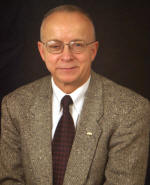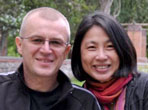January 27, 2006
|
Pat Jones, Director of Healthy Church Ministries
Thanks again to all who participated in our first cluster leader training. Just having you rub shoulders in the same room for a day and a half was a blessing to watch. YOU are key to making a difference in the lives of those you lead.
Please email me your cluster schedules as soon as possible. Pam and I would like to travel to be with you a time or two this year.
Some links you may find helpful:
If you want to do some demographic studies of your area, our Nazarene friends have a helpful tool at http://map.nazarene.org. Click on your state and if a Nazarene church is close by you can navigate around the site to get stats for your town.
Also, if you preach a message on the effects of pornography or have someone you are counseling who needs help, the following are some sites that have helpful info:
www.xxxchurch.com
www.pureonline.com
www.pureintimacy.org
As you lead, remember that the operative word is KINGDOM and everything we do has to be assessed on how it is positively contributing to the building of that Kingdom, His Kingdom and not ours.
Supporting you in prayer always!

 His primary responsibilities are to cultivate relationships and generate financial resources for the University. Hirschy will travel the tri-state area meeting with alumni and friends to share the Huntington University story.
His primary responsibilities are to cultivate relationships and generate financial resources for the University. Hirschy will travel the tri-state area meeting with alumni and friends to share the Huntington University story. About ten slots are still open for a mission trip to Poland this summer. It starts June 29 and ends July 11, 2006. The purpose is to work alongside UB endorsed missionaries Arek and Donna Delik (right) as they reach out to young people in Kutno, Poland, a city of 50,000. The event will involve teaching English as a second language to teenagers in a camp setting. It will cost $1700 per person. Donna Hollopeter will lead the group, and needs to know of your interest by March 1.
About ten slots are still open for a mission trip to Poland this summer. It starts June 29 and ends July 11, 2006. The purpose is to work alongside UB endorsed missionaries Arek and Donna Delik (right) as they reach out to young people in Kutno, Poland, a city of 50,000. The event will involve teaching English as a second language to teenagers in a camp setting. It will cost $1700 per person. Donna Hollopeter will lead the group, and needs to know of your interest by March 1. 

